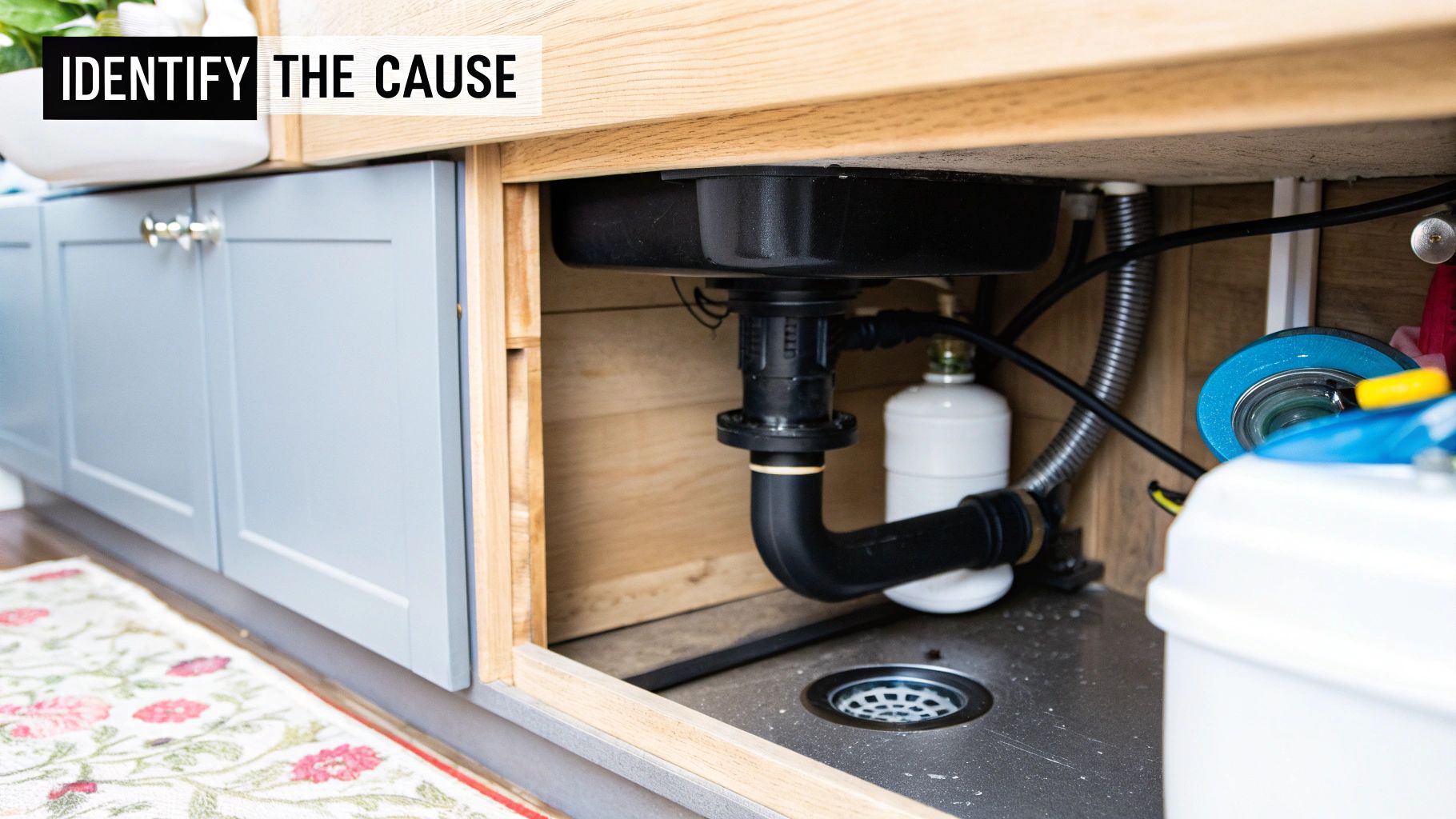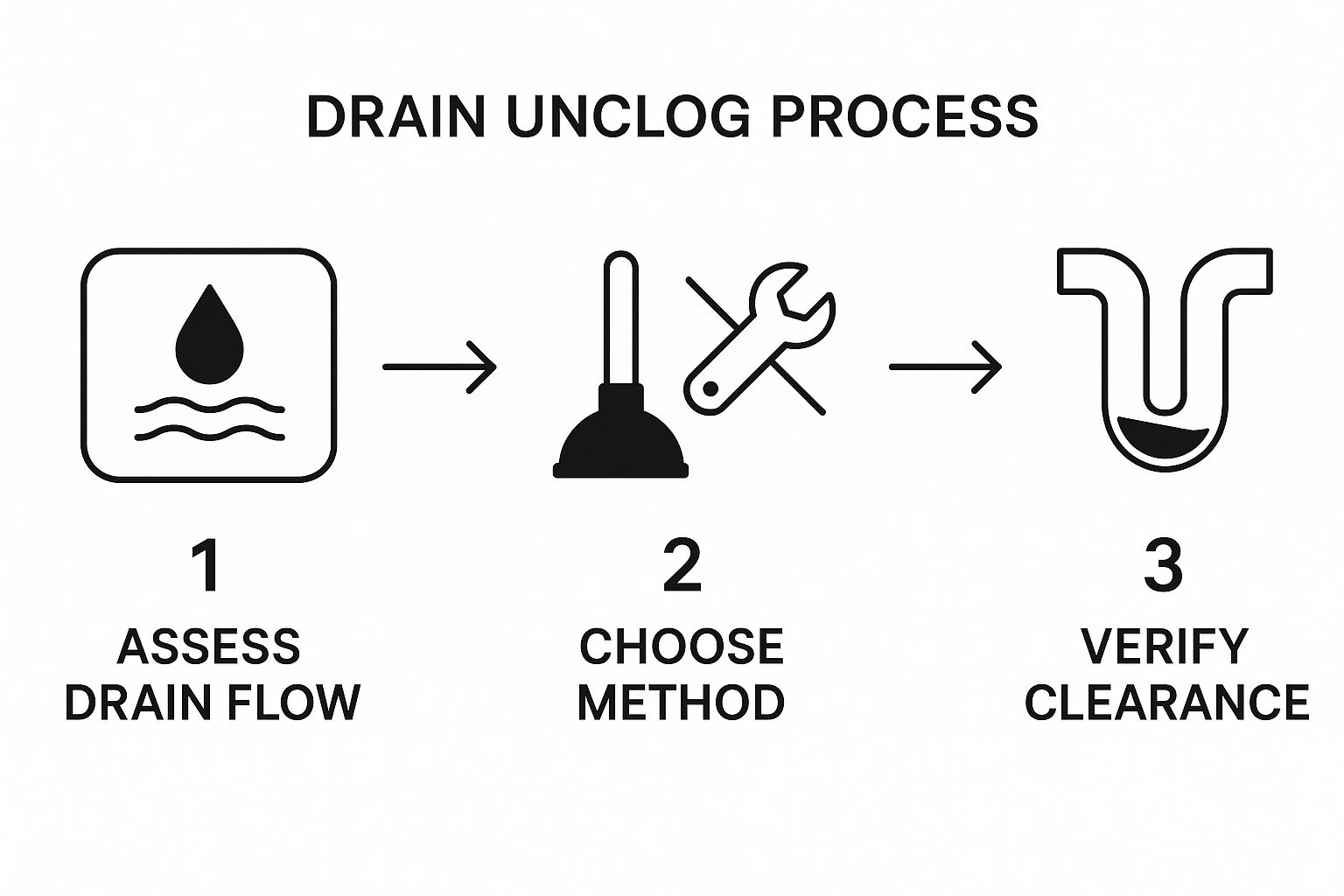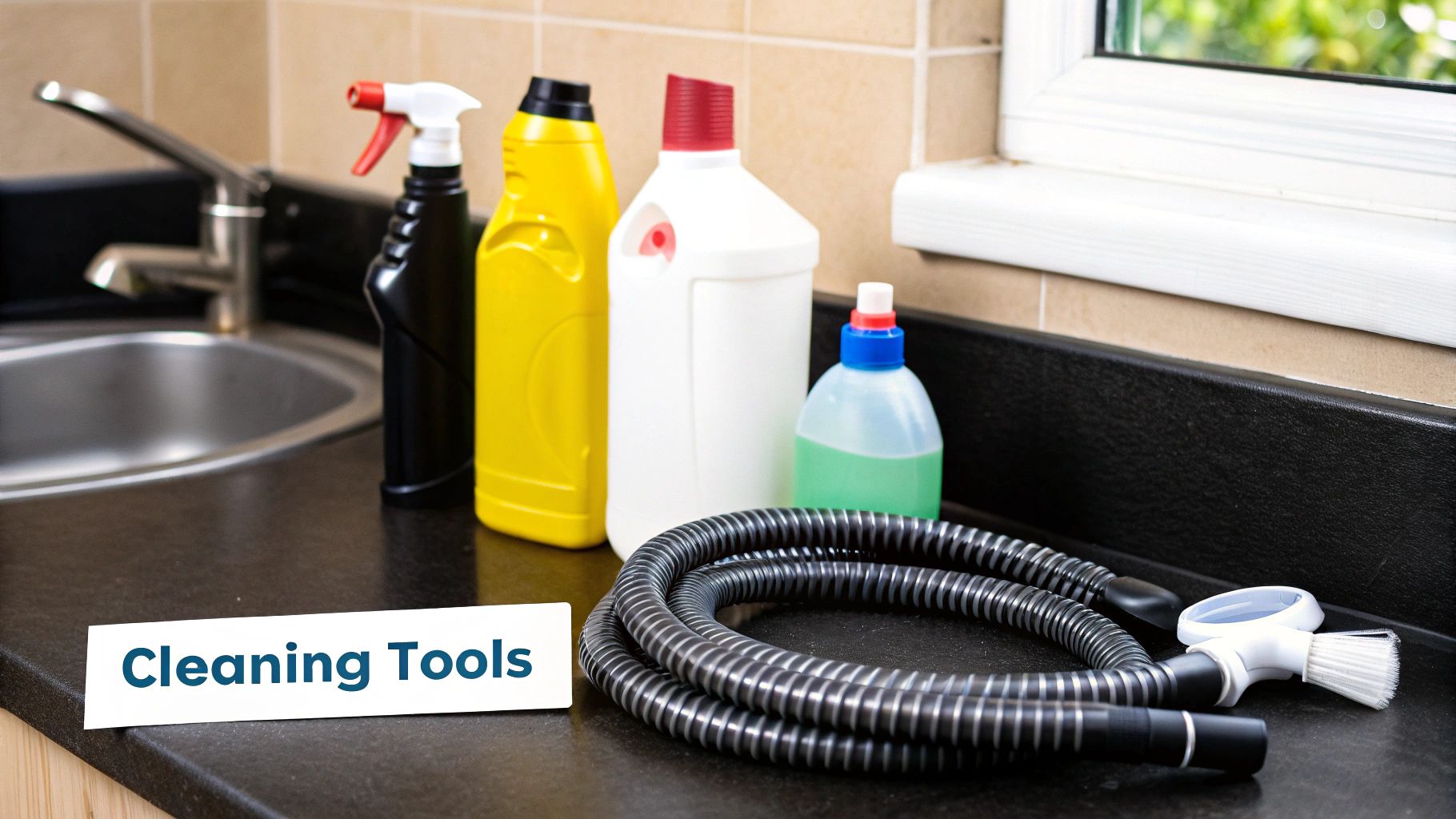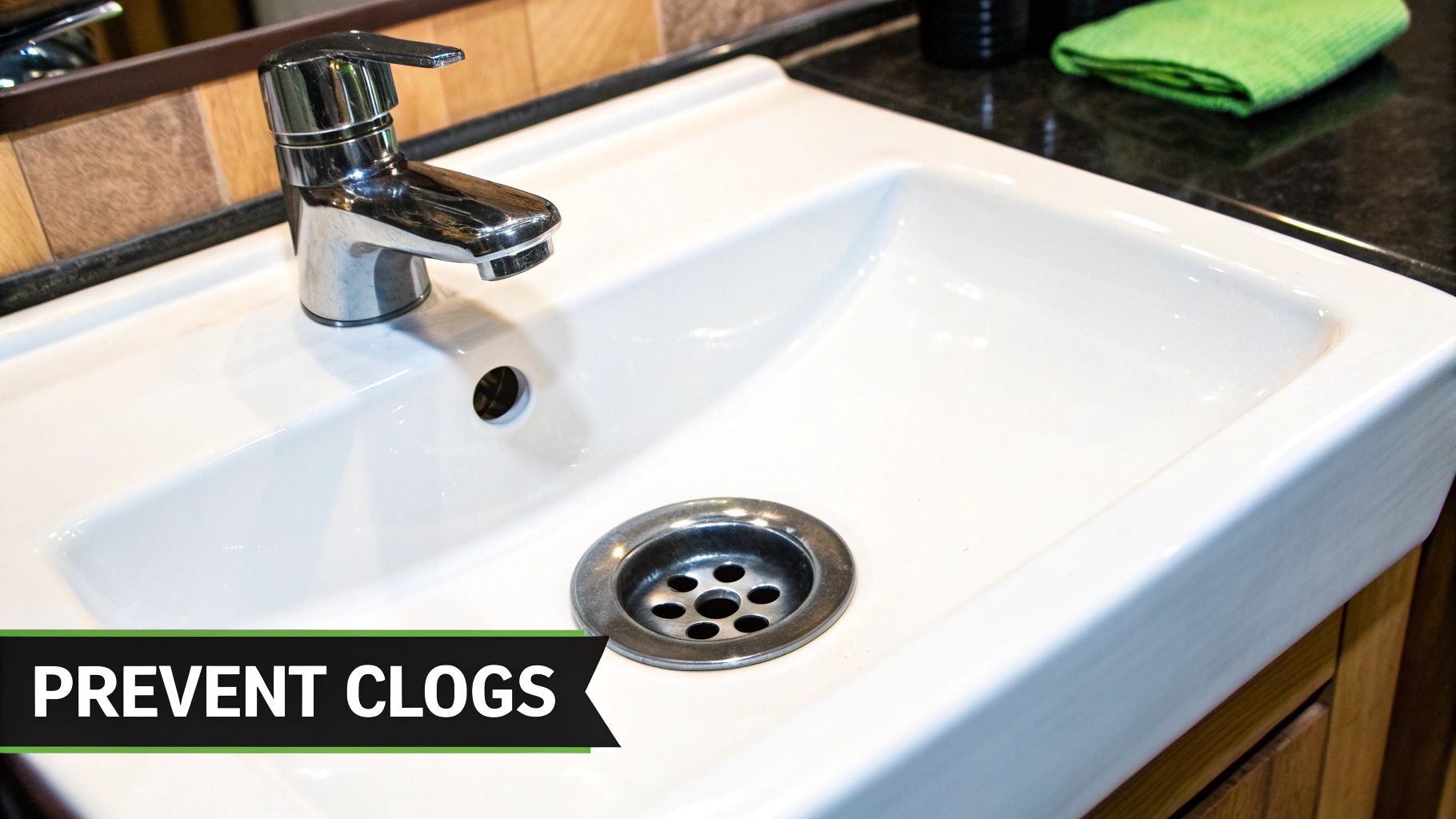Unblock a Drain in Eastbourne With These DIY Fixes
- Luke Yeates
- Aug 10, 2025
- 11 min read
That tell-tale gurgling from the sink or the frustratingly slow-draining shower is a sound most Eastbourne homeowners know all too well. Before you start to worry, take a breath. Most of the time, these blockages are simple DIY fixes, usually caused by everyday culprits like grease, stray hairs, or food scraps.
The trick is to play detective first. Figuring out what’s causing the problem will help you choose the right solution from the get-go.
First Steps to Unblock a Drain

So, where do you start? The first step is to diagnose the likely cause, and its location often gives the game away. Is it your kitchen sink that’s struggling after cooking a roast, or the bathroom shower after a week of hair washing? Here in Eastbourne, with our mix of modern and older properties, the cause can vary from home to home.
Finding the Culprit
Kitchen sinks are notorious for collecting fats, oils, and grease (FOG), which happily bind with any food particles that make their way down the plughole. FOG is a massive issue across the country. In the UK, there are roughly 370,000 sewer blockage incidents every single year, and a staggering 75% of them are caused by FOG, according to a report on UK sewer blockages.
Pro Tip from Harrlie Plumbing and Heating: A classic mistake we see in Eastbourne homes is trying to wash grease down the sink with hot water. It might look like it’s working, but that grease will just cool and solidify further down the pipe, creating a far more stubborn blockage later on.
On the other hand, bathroom drains are almost always clogged with a charming mixture of hair and soap scum. Over time, this combination forms a dense, stubborn plug that water can barely get past.
Sometimes, the problem is deeper or more persistent than a simple clog. That's when you need a professional eye. Our team at Harrlie Plumbing and Heating offers specialised Eastbourne drainage services to quickly pinpoint and sort out any blockage, no matter how big or small. Getting to the root cause is the only way to choose the most effective method, saving you time and preventing potential damage to your pipework.
Safe and Simple DIY Drain Unblocking Methods
Before reaching for those harsh chemical cleaners, it’s worth trying a few safer and surprisingly effective methods to unblock a drain. These techniques are much gentler on your pipes but still tough on the common clogs we see every day, helping you avoid causing unnecessary damage.
Let’s start with the simplest approach: boiling water. This trick works wonders against greasy build-ups, which are the usual culprits in kitchen sinks. Just carefully pour a full kettle of boiling water straight down the plughole. For many minor fatty blockages, that intense heat is all it takes to melt the grease and flush it away. If you notice the water starting to drain a bit faster, repeat it two or three more times.
The Natural Fizzing Solution
If hot water alone doesn't quite cut it, a classic combination of baking soda and white vinegar can work magic. This fizzy, bubbling reaction is fantastic for breaking down more stubborn grime without putting your pipes at risk.
Here's how to do it:
First, pour about half a cup of baking soda down the drain.
Follow it up with half a cup of white vinegar. You'll hear it start to fizz immediately.
Quickly cover the plughole with a cloth or the plug itself. This traps the reaction down in the pipe where it needs to work.
Let it sit and do its thing for at least 30 minutes.
Finally, flush everything through with another kettle of boiling water.
This is a go-to method for many Eastbourne households, especially for smelly kitchen drains, as it also does a great job of neutralising any unpleasant odours. The Harrlie Plumbing and Heating team often recommends this as a first-line defence before calling us out.
This simple infographic breaks down the logical flow you should follow when tackling a clog.
Mastering the Plunger
For more solid, physical blockages, a good old-fashioned plunger is your best friend. The key to using it effectively is creating a tight seal. Make sure there’s enough water in the sink to cover the plunger's rubber cup, place it firmly over the drain, and then pump it vigorously up and down for about 20-30 seconds. The suction and pressure you create should be enough to dislodge the blockage.
From our experience at Harrlie Plumbing and Heating, we strongly advise against using chemical drain cleaners. The older pipework found in many of Eastbourne’s lovely period properties, particularly in areas like Meads or Old Town, can be easily corroded by these aggressive chemicals. What starts as a simple clog can quickly turn into a serious and costly leak.
A failed DIY attempt can sometimes make matters worse. If you spot a new drip under the sink after your efforts, it’s a big clue that a seal or the pipe itself might have been compromised. If that happens, it’s worth reading our guide on how to [repair a leaking PVC pipe with easy DIY fixes](https://www.harrlieplumbing.co.uk/post/repair-leak-pvc-pipe-easy-diy-fixes-from-pros).
Getting to Grips with Stubborn Clogs: Your Basic Plumbing Toolkit

When the boiling water and vinegar trick doesn't cut it, it's time to roll up your sleeves and get a bit more physical. Don't worry, you won't need a van full of specialist equipment for these more stubborn clogs. Often, a simple plumber’s snake or a quick clean-out of the P-trap is all you need to get things flowing freely again.
These tools are your go-to for tackling blockages that are physically stuck in your pipes—think of a dense clump of hair, a build-up of gunk, or even a lost bottle cap. Learning how to use them can save you a call-out fee and give you the confidence to handle future drain dramas yourself.
Wielding a Plumber's Snake (Auger)
A plumber’s snake, sometimes called a drain auger, is a long, flexible coil of wire that you feed down the drain to either break up a blockage or pull it out. It's a lifesaver for clogs that are just too far down the pipe for a plunger to reach.
To get started, simply feed the end of the snake into the plughole. Gently push it down the pipe while turning the handle. You’ll feel a bit of resistance once you hit the obstruction. That’s your target.
Turn the handle clockwise. This helps the corkscrew tip at the end of the snake to dig into the clog, much like a corkscrew into a wine cork.
Gently pull it back. You're trying to either dislodge the whole clump and retrieve it, or break it into smaller pieces that can be washed away.
Flush it out. Once you've dealt with the blockage, run plenty of hot water down the drain to clear out any leftover bits and pieces.
This method takes a little patience, but it’s incredibly effective when other, less direct methods have failed.
Tackling the P-Trap
If the blockage is under your kitchen or bathroom sink, the culprit might be hiding in the P-trap. This is the U-shaped bit of pipe you can see directly beneath the sink. Its job is to hold a small amount of water to stop sewer gases from wafting into your home. Unfortunately, it's also the perfect spot for food scraps, grease, and small objects to get stuck.
Cleaning it out is surprisingly straightforward. First, pop a bucket or a basin underneath the trap to catch any water and sludge that will spill out. Then, you'll need to unscrew the two large slip nuts holding the trap in place—you can often do this by hand, but a pair of channel-lock pliers might help if they're tight.
Once it’s loose, pull the U-shaped section away and empty its contents into your bucket. Give it a good clean before putting it all back together.
A pro tip from our Harrlie Plumbing engineers: Always inspect the rubber seals on the P-trap before putting it back together. These seals can easily get worn or dislodged. A quick check prevents the most common post-DIY leak we see in Eastbourne homes.
How to Prevent Future Drain Blockages
The old saying "prevention is the best cure" couldn't be more true when it comes to plumbing. The easiest way to deal with a blocked drain is to stop it from happening in the first place. By adopting a few simple habits, you can save yourself a lot of hassle and keep your pipes flowing freely. It really just comes down to being mindful of what you're letting go down the plughole.
The biggest culprits we see causing blockages in Eastbourne homes are fats, oils, and grease (FOG), coffee grounds, and stray food scraps. A common mistake is washing greasy pan residue down the sink. Instead, get into the habit of pouring cooled grease into an old jar or another disposable container. Once it's full, you can just toss it in the bin.
Develop a Simple Maintenance Routine
A little bit of consistent maintenance is your strongest defence against slow-draining pipes and surprise blockages. You don't need to do anything complicated; a monthly flush can work wonders. Just set a reminder to carefully pour a kettle full of boiling water down each drain once a month. This simple step helps melt and wash away any minor build-up before it turns into a major headache.
This regular flush can also highlight other issues. If your drains are still slow despite this, it might be linked to low water pressure. If you're constantly battling weak flow throughout your home, you might find our guide on [how to fix water pressure in your Eastbourne home](https://www.harrlieplumbing.co.uk/post/how-to-fix-water-pressure-easy-tips-for-your-eastbourne-home) useful.
Another major offender, especially for toilets, is wipes. Even though many are marketed as ‘flushable,’ this can be incredibly misleading. A 2017 analysis revealed that cleaning wipes are a leading cause of sewer blockages in the UK. They simply don't break down like toilet paper does, instead clumping together to create serious obstructions. You can [discover more about UK sewer blockage causes](https://www.statista.com/statistics/791452/sewer-blockage-causes-united-kingdom-uk/) and the scale of the problem.
Our advice at Harrlie Plumbing and Heating: Treat your drains with a bit of respect. Only water, soap, and toilet paper should be going down them. Everything else, including 'flushable' wipes, kitchen roll, and cotton buds, belongs in the bin. We see the consequences of this all too often in Eastbourne’s drainage system.
Making a few small changes can have a massive impact:
Use drain strainers: These simple mesh guards are fantastic. Pop them over the plugholes in your kitchen sink and shower to catch hair, food particles, and other debris.
Scrape plates clean: Before rinsing plates in the sink, always scrape any leftover food into your food waste or general bin.
Be careful with liquids: Never pour paint, car fluids, or harsh chemicals down the drain. They can damage your pipes and harm the environment.
When to Call a Professional Plumber in Eastbourne

Knowing your limits is the golden rule when you’re trying to unblock a drain. While a bit of DIY can sort out simple clogs, pushing things too far can quickly escalate a minor annoyance into a full-blown plumbing disaster. There are definite warning signs that a blockage is beyond a quick fix and needs a professional eye.
If you find yourself battling the same clog every few weeks, that’s a classic sign of a deeper issue. It usually means the real problem is much further down the pipe than your home tools can ever hope to reach.
Signs of a Serious Blockage
There are several red flags that should have you reaching for the phone to call in the experts. Ignoring them can lead to much bigger headaches and more costly repairs down the line. Keep an eye out for these tell-tale signs:
Multiple Drains Backing Up: If your toilet, shower, and kitchen sink are all struggling to drain at the same time, this isn't an individual pipe problem. It points directly to a blockage in your main sewer line.
Foul Odours That Linger: A persistent, unpleasant smell of sewage coming from your drains is a clear signal that waste isn't being carried away as it should be.
Strange Gurgling Sounds: Hearing gurgling from your drains when you flush a toilet or run a tap means air is getting trapped in the pipes by a significant obstruction.
These symptoms almost always require specialised equipment to solve. For instance, our Harrlie Plumbing and Heating team recently helped an Eastbourne client in the Roselands area with a kitchen sink that just wouldn't clear. After weeks of failed DIY attempts, we brought in our CCTV drain survey equipment, which revealed a massive build-up of grease in an external drain. Only professional high-pressure jetting could unblock a drain this severe.
Trusting a professional not only solves the immediate problem but also prevents you from accidentally causing more damage. A UK survey highlights a concerning gap between what people know about drain care and what they actually do. Despite being aware of the risks, bad habits like pouring fats down the sink continue, leading to stubborn blockages that only a professional can fix. Learn more about the UK’s drain habits on lanesdrainageservices.co.uk.
Of course. Here is the rewritten section, crafted to sound like it was written by an experienced human expert, following all your specified requirements.
Your Questions, Answered
Over the years, our team at Harrlie Plumbing and Heating has heard just about every question you can imagine when it comes to blocked drains. Homeowners in Eastbourne often have similar concerns, so we've put together some straightforward answers to the queries that pop up most often. This should help clear up any lingering doubts.
Should I Just Pour Chemicals Down the Drain?
In a word: no. We really advise against it. While the promise of a quick, cheap fix is tempting, those harsh liquid drain cleaners can be a nightmare for your plumbing. They're incredibly corrosive and can eat away at pipework, especially the older metal pipes common in many of Eastbourne’s beautiful properties.
What starts as a simple clog can quickly escalate into a much more serious—and expensive—leak. It's far safer to stick with mechanical methods like a plunger or a snake. If you want a liquid solution, enzymatic cleaners are a much better bet, as they work on organic matter without damaging your pipes or the local environment.
Is This Blockage My Problem or the Council's?
This is a great question, and there’s a simple way to figure it out. The golden rule is to look at the scope of the problem. If it’s just one fixture—say, the kitchen sink or a single shower—that’s draining slowly, the blockage is almost certainly on your property and is your responsibility.
However, if every single drain in your house starts backing up at the same time, or if you’ve spoken to your neighbours and they're having the same trouble, the issue is likely in the main sewer line. For anyone living in Eastbourne, that’s managed by Southern Water. At that point, it’s their responsibility to sort it out, so you’ll need to give them a call to report it.
How Often Do I Need a Professional Drain Clean?
Honestly, it really depends on your home. For most modern houses in areas like Sovereign Harbour, you probably only need to call in a professional when a stubborn clog actually appears.
But, if you're in an older Eastbourne property, have a garden with large, established trees (their roots love to find their way into pipes!), or just have a busy household with heavy water usage, a preventative clean can be a very smart move.
"For most homes, routine professional cleaning isn't essential unless you see frequent issues. However, for older properties or those with large gardens, a preventative clean every 2-3 years is a smart investment. A CCTV survey can give you a clear picture of your pipe's health."
At Harrlie Plumbing and Heating, we often recommend a quick CCTV drain survey for homeowners who are unsure. It gives us a real-time look inside your pipes so we can assess their condition and let you know if any maintenance is needed before a small issue becomes a big one.
Don't let a stubborn blockage disrupt your day. For fast, reliable help with any plumbing issue in Eastbourne, trust the experts.
Contact Harrlie Plumbing and Heating for a free, no-obligation quote today at https://www.harrlieplumbing.co.uk.

Comments